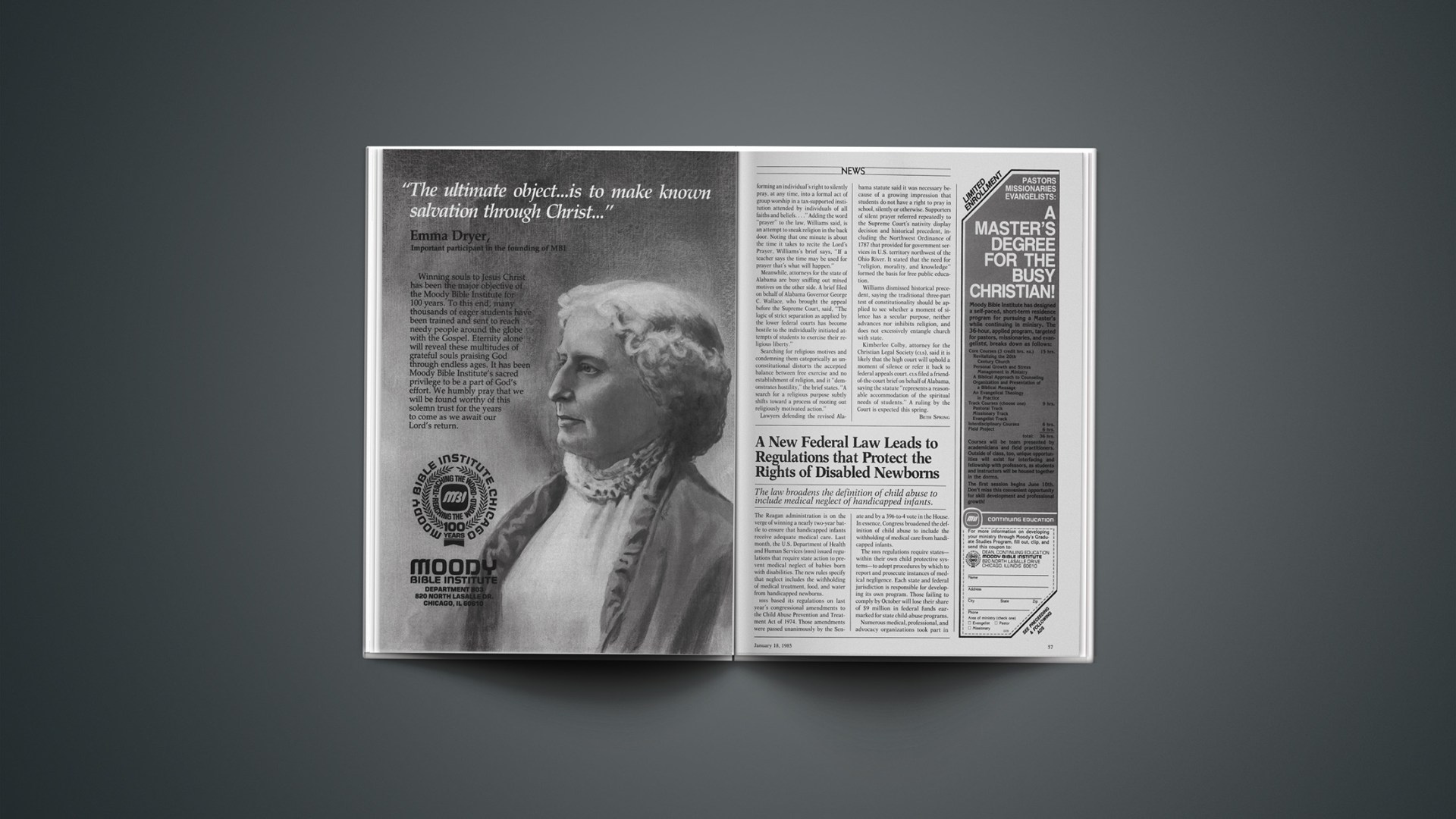The law broadens the definition of child abuse to include medical neglect of handicapped infants.
The Reagan administration is on the verge of winning a nearly two-year battle to ensure that handicapped infants receive adequate medical care. Last month, the U.S. Department of Health and Human Services (HHS) issued regulations that require state action to prevent medical neglect of babies born with disabilities. The new rules specify that neglect includes the withholding of medical treatment, food, and water from handicapped newborns.
HHS based its regulations on last year’s congressional amendments to the Child Abuse Prevention and Treatment Act of 1974. Those amendments were passed unanimously by the Senate and by a 396-to-4 vote in the House. In essence, Congress broadened the definition of child abuse to include the withholding of medical care from handicapped infants.
The HHS regulations require states—within their own child protective systems—to adopt procedures by which to report and prosecute instances of medical negligence. Each state and federal jurisdiction is responsible for developing its own program. Those failing to comply by October will lose their share of $9 million in federal funds earmarked for state child-abuse programs.
Numerous medical, professional, and advocacy organizations took part in drafting the HHS document. Many of those same groups came together to issue the 1983 landmark statement “Principles of Treatment of Disabled Infants.” The new regulations are in large part an outgrowth of that statement.
Quoting the 1983 document, HHS affirms that “when medical care is clearly beneficial, it should always be provided” and that the “anticipated or actual limited potential of an individual … must not determine the decisions concerning medical care.”
The regulations stipulate that withholding treatment is ethically and legally justified if the infant is irreversibly comatose or if the treatment would merely prolong dying. But where there is any doubt, the regulations read, “a presumption always should be in favor of treatment.”
The government entered the fray over medical care for handicapped newborns following the 1982 death of a Down’s syndrome baby who came to be known as “Infant Doe.” The baby died a few days after his parents decided not to authorize surgery that would have corrected a defect that prevented him from eating. A month later, HHS notified some 6,800 hospitals that they risked losing federal aid by denying proper care to handicapped infants.
In March 1983, HHS issued regulations requiring hospitals to post notices that federal law forbids discriminatory failure to care for handicapped infants. Based on the Rehabilation Act of 1973, those rules also called for the establishment of toll-free telephone hotlines to report complaints. After the American Academy of Pediatrics (AAP) and others filed suit, a federal judge disallowed the rules.
Later that year, HHS issued modified regulations. But following a lawsuit filed by six medical groups, including the American Medical Association (AMA), the modified regulations were invalidated by the U.S. District Court of New York (CT, July 13, 1984, p. 44).
HHS spokesman Hal Iveland said Congress’s appeal to child abuse laws represents a new approach to the same goal. “Apparently it [the issue of medical care for handicapped newborns] did not belong in civil rights,” he said. “… The biggest difference between this legislation and past efforts is that there is no direct federal involvement. The responsibility is all on the states.”
The AMA, however, has protested what it says is unwarranted government intrusion. A spokeswoman said the AMA had not yet prepared a formal response to the new regulations, but that it opposed the legislation on which the rules are based. “We believe the parents and physician … should have the right to decide on treatment,” she said. “[Otherwise], people without medical knowledge could insist on treatment that might prolong dying.”
U.S. Surgeon General C. Everett Koop said the legislation would not mandate medical treatment that was futile. He pointed out that the two major medical societies that specialize in infant care disagree with the AMA. The AAP and the American College of Obstetricians and Gynecologists support the language of the legislation passed by Congress.
Koop played a major role in drafting guidelines for Infant Care Review Committees, which the HHS encourages but does not mandate. The purpose of such committees is to provide support and guidance to hospital personnel and families of disabled infants. Koop said more hospitals throughout the country are estabishing those committees, and that this trend will limit the number of complaints of medical neglect.
“I’m very encouraged that Congress saw the need to act and did so,” Koop said. The biggest problem, he added, will be for state child abuse agencies to accept a definition of child abuse that does not conform to the stereotype. Said Koop, “Baby Does are not cute little blond kids who get beat up by their father because they’re naughty.”










